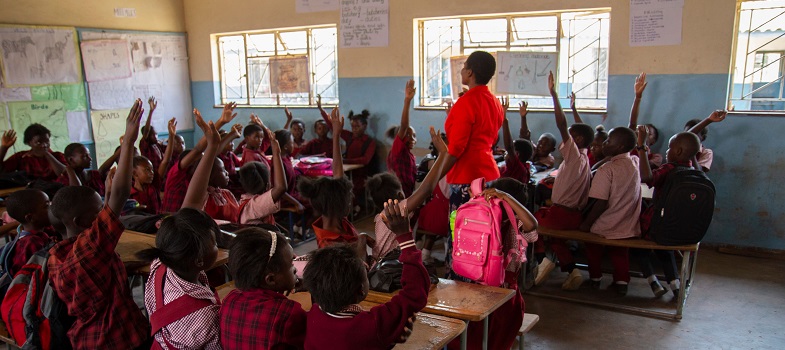Training guide
4. Using local resources
4.2. Using local experts
Your local community includes people who may come in to tell stories or describe their jobs to learners: a chief, a farmer, a nurse or doctor, a parson, a hunter, a policeman, a tour guide, a story teller, a market trader or small business owner.
Maybe you are doing some work on money in mathematics or you are doing pattern in your art lessons. How could you introduce these topics to your learners in a way that will capture their interest? One way would be to invite in a local shopkeeper to talk about how they use money in their work or a local dressmaker who uses traditional patterned fabrics. If you choose to bring in a visitor, you need to be clear what you would like your learners to gain and learn from the experience and then follow the steps below to prepare.
Before the visit
- decide who you want to invite and why that person is appropriate for what you want your learners to gain from the visit
- ask your head teacher to send an invitation to the visitor
- ask your learners to write the invitation
- plan with your learners the questions they want to ask
- discuss how you will sit when the visitor comes – in rows or in a horseshoe shape so that everyone can see
- ask the visitor to bring some things to show the class.
On the day of the visit
Meet the visitor at the head teacher’s office and bring them to the class. Introduce the visitor to the class and allow them to talk for a short time to the class about what they do (10–15 minutes), showing what they have brought if appropriate. Encourage your learners to ask questions. When the visit is finished, ask one of your class to thank the visitor for coming.
After the visit
Think how you will use what your learners have seen and heard. You could ask them to share their ideas in groups and make lists or posters of the key things they learned. You could plan more lessons using the ideas and information as the context for them to learn more about the topic. They could research more about the topic. They could share their ideas with other classes or their parents during family pack meetings or the school open day.
Classroom Example 1.5: Organising a visitRead Peter’s experience of organising a visit. ‘I teach social studies to Grade 3. We were covering the section ‘learning about money’. I decided that the local bank manager would be a good person to come and talk to the class. In the syllabus it says: Knowledge about: Income and Expenditure; Items people ‘need’ – food, water and shelter, and ‘want’ – toys, games and sweets in life; Saving up for things you need or want in the future; Having money, losing money stolen, wanting things you cannot afford. Mr Malet arrived at school five mins before the lesson, and I was getting quite worried about whether he would turn up. I had not met him before – we had talked on the phone and communicated by text message. He came into class and after I had introduced him, he talked to the class for over half an hour. I could tell they were getting restless, but he was such a fierce looking man, they kept quiet. He talked about how to set up a bank account and then gave a lecture on the perils of spending more than you earn. At the end, I asked the children if they had any questions. They didn’t so I thanked Mr Malet and he left.’ In your groups discuss how Peter could have made the visit more successful and productive for the children. |
You might have mentioned aspects such as:
- Peter should have met Mr Malet at the bank
- he could have started by exploring whether Mr Malet wanted to come, or whether he had someone who might have been less fierce and more suitable
- he should have shared the syllabus and learning outcomes for the visit and rehearsed with Mr Malet what sorts of things he could talk about
- he could have also given him some questions he would have liked Mr Malet to address
- before the visit, Peter could have talked to the class about the visit and given them a chance to work in pairs to think of questions they would like to ask of a bank manager
- he could have prepared one or two children to ask their questions.
Activity 1.14: Local expertsAs you plan, think of how you can incorporate a local expert or visitor into a part of a lesson. What do you want the learners to gain from the visit? What activities would you ask your learners to do in order to get the most from this? Discuss with your colleagues which subject in the coming week or two would most benefit from this. Write notes in your Teacher Notebook. |
